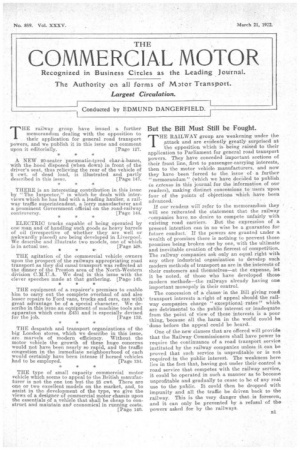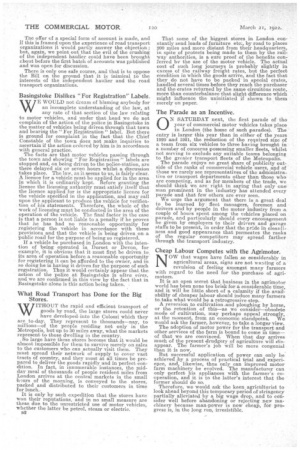But the Bill Must Still be Fought.
Page 1

Page 2

If you've noticed an error in this article please click here to report it so we can fix it.
THE RAILWAY group are weakening under the attack and are evidently greatly surprised at the opposition which is being raised to their application to Parliament for general road transport powers. They have conceded important sections of their front line, first to passenger-carrying interests, then to the motor vehicle manufacturers, and now they have been forced to the issue of a further " memorandum" (which we have decided to publish in extenso in this journal for the information of our readers), making distinct concessions to users -upon four of the points of objections which have been advanced. , If our readers will refer to the memorandum they will see reiterated the statement that the railway companies have, no desire to compete unfairly with existing road carriers. But the expression of a present intention can in no wise be a guarantee for future conduct. If the powers are granted wider a. Wealth of promises there is nothing to prevent those promises being broken one by one, with the ultimate and inevitable creation of the fiercest of competition. The railway companies ask only an equal right with any other industrial organization to develop such modern methods of transport as are in the interests of their customers and themselves—at the expense, let it be noted, of those who have developed thosemodern rnethoda—the railways already having one important monopoly in their control.
The concession of a clause•in the Bill giving road transport interests a: right of appeal should the railway companies charge "exceptional rates" which are detrimental to the public interest or inadequate from the point of view of those interests is a poor thing, 'because all the. harm in the world could be 'done before the appeal could be beard.
One of the new clauses that are offered will provide that the Railway Commissioners shall have power to require the continuance of a road transport service instituted by the railway companies unless it can be proved that such service is unprofitable or is not required in the public interest. The weakness here lies in the fact that, having got under their control a road service that competes with the railway service, it could be operated in such a manner as to become unprofitable and gradually to cease to be of any real use to the public. It could then be dropped with impunity and all the traffic be driven back to the railway. This is the very danger that is foreseen, and it can only be prevented by a refusal of thepowers asked for by the railways. Tne offer of a special form of account is made, and if this is framed upon the experience of road transport organizations it would partly answer the objection ; but, again, we point out that the evil of the crushing of the independent haulier could have been brought about before the first batch of accounts was Aublished and was open for discussion.
There is only one safe course, and that is to oppose the Bill on the ground that it is inimical to the interests of the independent haulier and the road transport organizations.
Basingstoke Dislikes "For Registration" Labels.
WE WOULD not dream of blaming anybody for an incomplete understanding of the law, at any rate of that section of the law relating to motor vehicles, and under that head we do not complain of the action of the police in Basingstoke in the matter of vehicles being driven through that town and bearing the "For Registration" label. But there is ground for complaint in the fact that the Chief Constable of the town does not make inquiries to ascertain if the action ordered by him is in accordance with general practice.
The facts are that motor vehicles passing through the town and showing "For Registration" labels are stopped and, on being driven to the police-station, are there delayed six or seven hours whilst a discussion takes place. The law, as it seems to us, is fairly clear. A licence for a vehicle must be applied for in the area in which it is ordinarily kept. Before granting the licence the licensing authority must satisfy itself that the licence applied for is the appropriate licence for the vehicle specified in the application, and may call upon the applicant to produce the vehicle for verification of his statements. Therefore, the whole of the work of licensing must be conducted in the area of the operation of the vehicle. The final factor in the case is that a person is not liable to a penalty if he proves that he has had no reasonable opportunity for registering the vehicle in accordance with these provisions and that the vehicle is being driven on a public road for the purpose of being so registered.
If a vehicle be purchased in London with the intention of being operated in Dorset or Devon, for example, it is obvious that it must first be driven to its area of operation before a reasonable opportunity for registering it can be afforded to the owner, and in so doing he is having it driven for the purpose of such registration. Thus it would certainly appear that the action of the police at Basingstoke is ultra vires, and we are confirmed in this view by the fact that in Basingstoke alone is this action being taken.
What Road Transport has Done for the Big Stores.
WITHOUT the rapid and efficient transport of goods by road, the large stores could never have developed-into the Colossi which they are to-day. They represent to thousands—nay, to millions—of the people residing not only in the Metropolis, but up to 30 miles away, what the markets represent to those dwelling in the country.
. So large have these stores become that it would be almost impossible for them to survive merely on sales to the customers who can actually visit them. They must spread their network of supply to cover vast tracts of country, and they must at all times be prepared to deliver the goads rapidly and in perfect. condition. In fact, in innumerable instances, the midday meal of thousands of people resident miles from London arrives at the central markets in the small heurs of the morning, is conveyed to the stores, packed and distributed to their customers in time for lunch.
It is only by such expedition that the stores have, won their reputations, and in no small measure are these due to the unrestricted use of motor vehicles, whether the latter be petrol, steam or eleetric. s2 That some of the biggest stores in London constantly send loads of furniture etc:, by road to places 200 miles and more distant from their headquarters, in spite of protests being made to them by the railway authorities, is a sure proof of the benefits conferred by the use of the motor vehicle. The actual cost of such long journeys is probably slightly in excess of the railway freight rates, but the perfect condition in which the goods arrive, and the fact that they do not have to be packed in special crates, handled several times before they reach the purchaser and the crates returned by the same circuitous route, more than counterbalance that slight difference which might influence the uninitiated if shown to them merely on paper.
The Parade as an Incentive.
0 N SATURDAY next, the first parade of the year of commercial motor vehicles takes place in London (the home of such parades). The entry is larger this year than in either of the years 1920 and 1921, the reduction of the required size of a team from six vehicles to three having brought in a number of concerns possessing smaller fleets, whilst not serving to exclude any suitable teams belonging to the greater transport fleets of the Metropolis.
The parade enjoys no great share of publicity outside of the ranks of commercial vehicle users, and of those we rarely see representatives of the administrative or transport departments other than those who are competing, and as for members of the trade, we should think we arc • riert in saying that only one man prominent in the industry has attended every parade and that few others are ever seen.
We urge the argument that there is a. great deal to be learned by fleet managers, foremen and drivers and by people in the motor industry from a couple of hours spent among the vehicles placed on parade, and particularly should every encouagement 'be glven by employers to their drivers and garage staffs to be present, in order that the pride in cleanliness and good appearance that permeates the, ranks of the regular competitors may spread farther through the transport industry.
Cheap Labour Competes with the Agrimotor.
NOW that wages have fallen so considerably in agricultural areas, signs are not wanting of a revulsion of feeling amongst many farmers with regard to the need for the purchase of agria motors.
It is an open secret that business in the agrimotor world ha-s been none too brisk for a considerable time, and it will be little short of a calamity if the avail. abilityof cheaper labour should induce many farmers to take what would be a retrogressive step.
A reversion to cultivation .and ploughing by horse, or the retention of this—as we consider—obsolete mode of cultivation, may perhaps appeal strongly, at the moment, from an economic standpoint. We would ask the farmer, however, to take a longer view. The adoption of motor power for the transport and other services of the farm is bound to come in time— of that we are convinced. When that day arrives much of the present drudgery of agriculture will disappear. The farmer's job will be more congenial than it is now. .
But successful application of power can only be achieved by a process of practical trial and experience, and likewise, thus only can improved motor farm machinery be evolved. The manufacturer can only perfect his appliances with the farmer's cooperation, and it is to the latter's interest that the former should do so.
Therefore, we would ask the keen agriculturist to look ahead beyond this temporary period of stringency partially alleviated by a big wage drop, and to cote sicler well before abandoning or rejecting new machinery because man-power is now cheap, for progress is, in the long run, irresistible.


































